Το τεστ Master είναι επιπέδου C2 στο Common European Framework και πιστοποιητικό επιπέδου 3 στο UK National Qualification Framework. Το επίπεδο C1 απονέμεται σε περίπτωση που κάποιος δεν επιτύχει στην εξέταση το ποσοστό της βάσης για C2 (65%). Πέραν από την εξέταση των 4 skills (Reading, Writing, Listening & Speaking) το επίπεδο εξετάζει
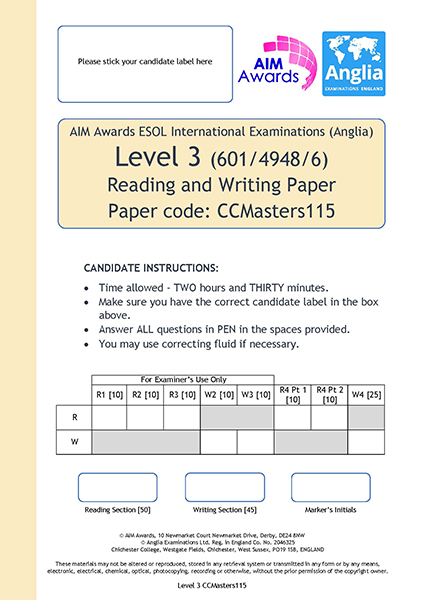
Χρησιμοποιείστε δικές σας ιδέες, κοιτάξτε τις σημειώσεις σας και γράψτε μια δομημένη έκθεση μεταξύ 300 και 400 λέξεων
Για παράδειγμα
Circuses are outdated and there is no place for them in the world of entertainment nowadays.
Μπορείτε να κρατάτε σημειώσεις, οι οποίες δεν θα διορθωθούν από τον εξεταστή .
Ένα καλό παράδειγμα έκθεσης σε αυτό το επίπεδο φαίνεται παρακάτω:
The circus, great entertainment or an outdated business?
Nearly everyone has been to one at some point in their life and all children, except those afraid of clowns, seem to love them. But in this modern world of internet, computers and television, isn’t the circus slowly becoming a little out of date?
One of the circus’ main attractions is definitely the animals, when you visit a circus you’ll be able to see all sorts of exotic animals performing all kinds of spectacular tricks. But in these modern times you’ll be confronted with all sorts of moral issues about those very animals, with entire organisations criticising the circus because of the way the animals are treated there. Some circuses try to go with the public opinion and perform shows without animals, but most if the time this results in less attendances and thus, less revenue.
I personally think it is okay to use animals in the circus, though the living conditions of the animals should undergo some big improvements. Sure, if you want to see some wild animals you could just switch the telly on and watch some Animal planet, but to actually see the animals for real is an entirely different experience, which we should not withhold from future generations.
But, because of what they see on television and on the internet, these days people are less and less easily amazed. So the circus has to become more spectacular and even more wild. In other words, modern times call for modern circuses. The human part of the performance becomes almost extreme, just for the sake of entertaining the audience. The public demand for circuses might be shrinking, but what’s left of it wants to enjoy some extreme shows and is probably willing to pay more money for it.
All in all the circus is still a very popular form of family entertainment and always will be, because, in my opinion, the circus is something that’s simply timeless. And despite the increasing negative public opinion on circuses, I highly doubt that the demand for them will ever cease.
To Proficiency είναι επιπέδου C1 στο Common European Framework και πιστοποιητικό επιπέδου 2 στο UK National Qualification Framework. Πέραν από την εξέταση των 4 skills (Reading, Writing, Listening & Speaking) το επίπεδο εξετάζει
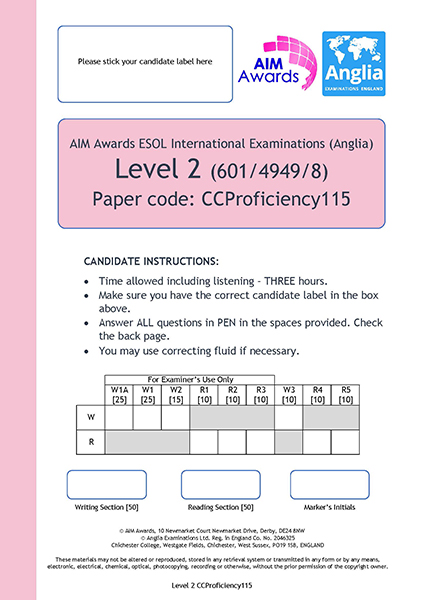
Ο υποψήφιος έχει ένα πολύ καλό ενεργό λεξιλόγιο και δομημένη κατανόηση και για αυτό τον λόγο μπορεί να κάνει μάθημα στα Αγγλικά περεταίρω και σε ανώτερη εκπαίδευση.
Smoking should be banned in all public places, including bars and restaurants.
Nowadays an increasing pattern of arguments may be noticed as far as smoking is concerned. Should it be banned in all public places or must it continue to be allowed? This is a controversial issue which separates people into two opposing groups: supporters and opponents of smoking.
The most significant reason for saying that smoking should be banned is the health factor. Not only the smoker, but also the people around him may damage their lungs and in the worst case suffer from lung cancer. In addition, pregnant women shouldn’t be exposed to cigarette smoke because – as Doctors say – smoke can easily damage the unborn baby, and cause it serious problems, after it is born.
Furthermore, another important reason that shows that smoking should be restricted and banned in public places is that of the discomfort it creates. Imagine a smoker entering a ‘no smoking’ bar, and all of the people around him smelling the smoke on his shirt and slowly moving away from him. In addition to the above, a smoker’s breath is very bad and a person who does not smoke will feel discomfort talking with him.
On the other hand, a majority of people state that smoking is a right that every person has, and shouldn’t be banned because that would mean violation of his human rights. Of course, tobacco industries are also against a smoking ban in public places due to well-known reasons. They will lose millions of dollars if the ban exists because the person will only smoke in his house and will not buy cigarrettes all the time.
Concluding, and taking all the above into consideration, smoking plays an integral part in many people’s lives but, as far as the ‘public’ factor is concerned we shouldn’t smoke in public places because that would mean violation of a non-smoker’s rights, whereas the smoker can choose not to if he or she wants.
Το Advanced είναι επιπέδου Β2 στο Common European Framework of Reference και επιπέδου 1 στο UK National Qualification Framework. Πέραν από την εξέταση των 4 skills (Reading, Writing, Listening & Speaking) το επίπεδο εξετάζει:
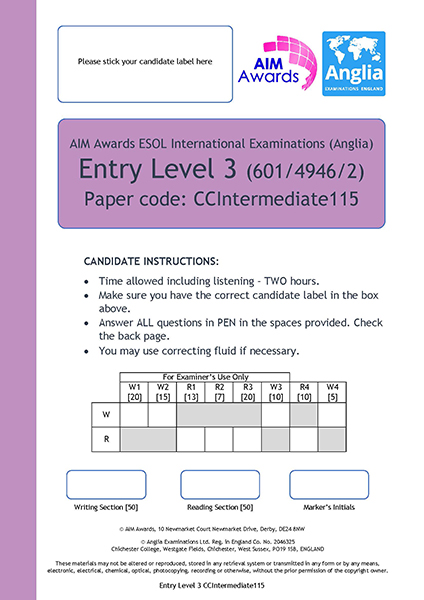
| GRAMMAR AND STRUCTURES | WHAT ARE THEY USED FOR? | SOME EXAMPLES |
| INVERSION | ||
| The inversion of subject and verb after certain negative adverbial introductions, e.g. never, rarely, hardly ever, not only, little, seldom | Creating emphasis, varying style and idiom | Never have I seen such a terrible film. Little did he know he would one day be Prime Minister. Not only was it raining, it was also cold. |
| VERBS FOLLOWED BY THE PAST TENSE | ||
| I wish, it’s about time, it’s high time | Expressing hypothesis, regret, decision making and the need for decision making | I wish I had £1million. It’s high time we did some work. It’s about time he bought a new car. |
| DEDUCTION | ||
| Using modal verbs followed by the non-finite and perfect non-finite verb using will | Expressing hypotheses and deductions in varying degrees of certainty | Jane will be in bed at this time of night. They should have heard the telephone. They must have gone out. He can’t have finished his homework. If he had, he would have put it on my desk by now. John might be sitting in the theatre already. |
| THE INFINITIVE | ||
| After certain verbs After certain adjectives After question words The perfect infinitive | I hope to hear from you shortly. We can’t afford to give you a pay rise. I want you to do something for me. It’s very difficult to explain. Tell me where to go/ how to get there/ what to say. I’d love to have met him. He doesn’t seem to have done it. | |
Watching television is a waste of time. Discuss.
I believe that watching television is a waste of time, because nowadays there is nothing good on television anymore. There are too many commercial channels that have one goal: to make as much money as they possibly can.
These channels try to manipulate people by making their programmes ‘spectacular’ but the truth is that a lot of these programmes are plain disgusting. Especially their documentaries are like this, they are not humane anymore.
Of course, the public channels cannot stay behind so they will try to bring some excitement into their programmes as well. Their power is decreasing but what can we do about it? People want spectacle, they want fireworks!
The worst thing about these commercial channels is the fact that they pretend to be sophisticated while they are really not. They say that the goal of their documentaries is to ‘give an objective insight in the society we live in’ but what they are really doing is making fun of people, and they know that this will appeal to the audience. All of this just to make more money.
If this trend continues, I do not want to turn my t.v. anymore. Watching television has become a complete waste of time and people should realize that there are much better things to do in this world than watching other people’s misery. For instance: go read a book!
Το Intermediate είναι επιπέδου Β1 στο Common European Framework of Reference και επιπέδου Entry Level 3 qualification στο UK National Qualification Framework. Πέραν από την εξέταση των 4 skills (Reading, Writing, Listening & Speaking) το επίπεδο εξετάζει:
| GRAMMAR AND STRUCTURES | WHAT ARE THEY USED FOR? | SOME EXAMPLES |
| VERBS | ||
| Reported speech | Repeating messages Passing on information Telling stories, jokes Checking facts | “What is the height of the Empire State Building?” He wanted to know what the height of the Empire State Building was. “Did you phone your parents?” said Jane. Jane asked us if we had phoned our parents. |
| The third conditional – if/past perfect tense + would have/non finite verb | Expressing regret Musing Describing a past that never was Talking through the consequences of our actions | They would have gone to the concert if they had had tickets. If he had known, he would have finished earlier. |
| Past Perfect | ordering the past | as in reported speech and 3rd conditional above |
| The gerund – after certain prepositions in certain idiomatic expressions | After leaving work, he went to the gym. It’s no use talking to him. Is it worth doing? | |
| To have something done | Expressing the fact that the speaker commissioned an activity | John had his house painted. |
| CONJUNCTIONS | ||
| Conjunctions of reason and purpose, cause and result, concession As connectives – and, but, nevertheless, or, however | Talking about why people do things, the purpose of something, its cause, expressing surprise Expressing connections in a sentence, text or argument | She goes to the gym in order to keep fit. There is a lack of water as a result of the hot weather. Despite/in spite of his wealth, he wasn’t happy. |
| VARIATION IN WORD ORDER | ||
| Changes in word order in specific situations | Expressing information accurately | To the north is… |
“From the moment I saw her I knew we would be friends.”
Continue the story.
From the moment I saw her I knew we would be friends. She was the tallest girl in my class. It was the first school day and I was really excited. I was sitting on my desk and watching her. She was smiling and her white teeth were shining like diamonds. Her blue eyes were like the bright September sky. She was wearing an yellow hat on her thick brown hair. Her clothes were very nice. She was a wearing black striped skirt and an orange T-shirt with flowers.
When I said ‘Hello’ I understood that she was a very kind person. We started to talk about different things and we sat on next door desks. This was the beginning of our friendship. Now we’re best friends and we love spending our free time together. We really enjoy going for a walk in the nearest park, or having a party in her house. We love rollerblading in hot summer evenings, or going to the local swimming pool. We’re all the time together.
All my life I had been looking for a best friend, and now I’m really happy because I found her!
Το Pre-Intermediate είναι επιπέδου A2+ στο Common European Framework of Reference. Πέραν από την εξέταση των 4 skills (Reading, Writing, Listening & Speaking) το επίπεδο εξετάζει:
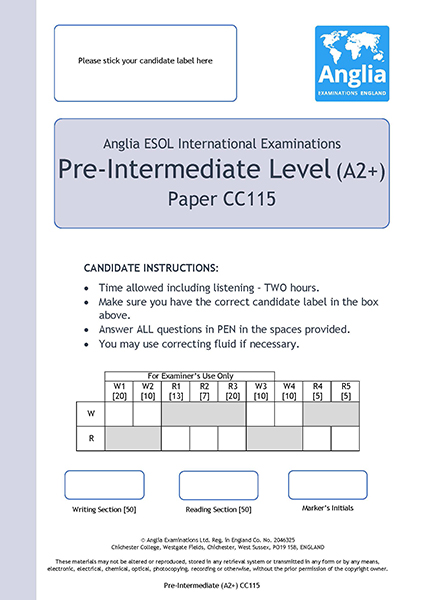
| GRAMMAR AND STRUCTURES | WHAT ARE THEY USED FOR? | SOME EXAMPLES |
| VERBS | ||
| The passive voice | Talking about a process, Omitting the active subject | The best computer games are made in Japan. The new church was built last year. |
| The second conditional – if / past tense + would / non finite verb | Talking about hypothetical situations musing | If I worked harder, I would get higher marks. If I won some money, I would buy a new car. |
| Present perfect continuous | Expressing unfinished or recently completed actions | How long have you been living in London? |
| The gerund after certain verbs | I enjoy learning English. I hate eating spaghetti. | |
| Non finite verbs in particular phrases: e.g. make someone do something, let someone do something | Expressing persuasion and permission | Mary’s parents let her drive their car. My father made me do my homework. |
| I’ would rather + non finite verb I had better + non finite verb (Both of these in contracted forms too: I’d better, he’d better, we’d rather etc | Expressing preference and advice | I would rather eat fish than meat. You had better take an umbrella or you’ll get wet. I’d rather eat… You’d better take… |
| ADVERBS | ||
| For and since More adverbs of frequency, manner, time or degree | Expressing time periods from a point in the past, relating them to the present Describing how often, when, how, and how much people do something | I have lived in this house for five years. I haven’t swum in the sea since last summer. I’m still here. He’s already finished. That bird rarely visits Britain. We hardly knew him. |
| CONCURRENCE | ||
| Neither do I/so do I | Expressing concurrence with a positive or a negative statement Expressing concurrence within a positive or negative statement | I don’t like playing computer games. Neither do I. I like eating chocolate. So do I. Jane loves chocolate and so do her friends. I don’t like cabbage and neither does my sister. |
The Worst Week of My Life
The worst week of my life was when my dog died.
It was such an beautiful and sweet animal. My parents bought him for me when I was five years old. His name was Bobby. He died two years ago. He was sick and the only thing that he did was sleeping. And when he died I couldn’t sleep for a week. I missed him.
I couldn’t eat that whole week. I’ve still got his pictures. That same week I went to the shopping centre with my friends and I was still a bit tired. We went together to an animal shop and my friends bought a new dog for me. We called him Tommy. He looked the same as Bobby, but Tommy was younger. I often think about Bobby, but I’m getting over it.
Το Elementary είναι επιπέδου A2 στο Common European Framework of Reference. Το speaking είναι προαιρετικο. Πέραν από την εξέταση των 4 skills (Reading, Writing, Listening & Speaking) το επίπεδο εξετάζει:
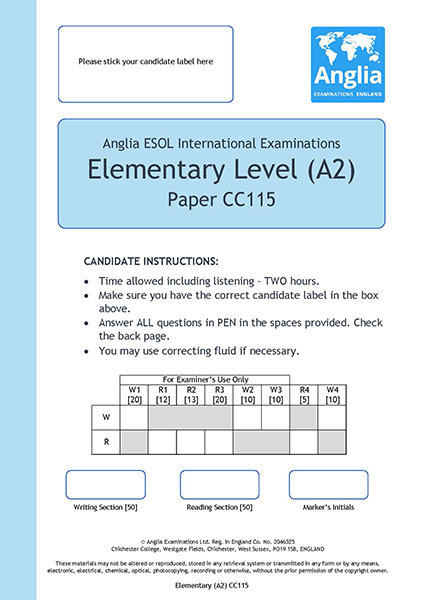
| GRAMMAR AND STRUCTURES | WHAT ARE THEY USED FOR? | SOME EXAMPLES |
| VERBS | ||
| Future simple -will 1st conditional – with ‘if’ clause present and result clause will/won’t | Talking about future plans Talking about future plans which have conditions on them | What will you do when you are older? If it rains, we won’t go to the park. |
| Future of intention ‘be going to’ | Talking about future intentions | I’m going to see a film this evening. |
| Past continuous – when, while | Talking about past activities which were interrupted | I was having my breakfast when the postman knocked. While I was studying, he played loud music. |
| Used to | Talking about long past habits and states | My father used to work in an office. My sister used to have long hair. |
| Modals -should, must | Expressing obligation and advice | You must study hard if you want to go to university. You mustn’t worry about it. You should always lock your car. |
| Infinitive of purpose | Talking about the purpose of doing something | Jane went to America to learn English. |
| QUESTION TAGS | ||
| Isn’t he? Aren’t you? Do you? Etc | Asking for confirmation of a negative or positive statement or inviting an answer to a question | You are coming to my party, aren’t you? You haven’t seen my car keys, have you? |
| RELATIVE PRONOUNS | ||
| Which, who, that | Identifying people and objects | This is the best cake that I have ever eaten. Jack is the one who is sitting at the back of the class. |
| REFLEXIVE PRONOUNS | ||
| Myself, himself, herself, etc. | Identify people and objects | He hurt himself. |
| ADVERBS | ||
| Adverbs of frequency, e.g. never, sometimes; adverbs of manner, e.g. quietly, slowly; adverbs of time, e.g. today, now. Adverbs of degree, e.g. a lot, a little (and associated word order) Simple modal adverbs e.g. possibly, probably, perhaps Adverbs of sequence e.g. first, finally, next, then | Describing how often, how, when and to what extent people do something. Indicating degree of possibility. Ordering events and understanding instructions and directions | I have never flown in a plane. At the moment, the children are playing in the park. The children walked home slowly. He is probably in his room. First, I had my breakfast. Go down the road and then straight on. |
| The contrast of too/enough | Talking about the extent of something | The student isn’t trying hard enough, he never does his homework. The student is trying too hard, he will make himself ill. |
| PREPOSITIONS | ||
| Prepositions as used in some very common phrasal verbs* and prepositional phrases*. | You must put on a hat if you go out in the sun. I am very fond of my pets. | |
| INTENSIFIERS | ||
| e.g. really, quite, so, very | Indicating degree | It is really hot today. |
| SPOKEN DISCOURSE | ||
| Markers e.g. right, well. Use of substitution. | Structuring conversation. Responding appropriately | “Right, has everyone got a book?” I think so. I hope so. |
| FORMAL IDENTIFICATION | ||
| First name, surname, age, date of birth, address, postcode, country, nationality. | Coping in formal situations especially when filling in forms | Date of Birth: 30.10.78 |
The Birthday Party
My favourite birthday party was yesterday. I had a great time.
When we woke up in the morning, we went to the cake shop to buy my birthday cake. It was beautiful. It had the shape of a castle. I wanted to eat it before the birthday party but I was patient and I didn’t eat it.
In the afternoon, my cousins, my aunt and my uncle finally arrived. I was so happy. We all sang Happy Birthday and after that we ate the cake. I also had a lot of presents.
This day was the best day of my life.
Το Preliminary είναι το πρώτο από τα επίπεδα που διαιρεί το τεστ σε ξεχωριστές ενότητες: reading (περιλαμβάνοντας και το use of English), writing, listening, και speaking. Το speaking είναι προαιρετικο. Είναι επίσης το πρώτο από την γκάμα των 10 πιστοποιητικών που προσφέρουν οι εξετάσεις Αγγλικής γλώσσας Anglia που αναγνωρίζεται από το Common European Framework of Reference level. Και είναι επιπέδου A1. Τα νέα πράγματα που εξετάζονται σε αυτό το επίπεδο είναι:
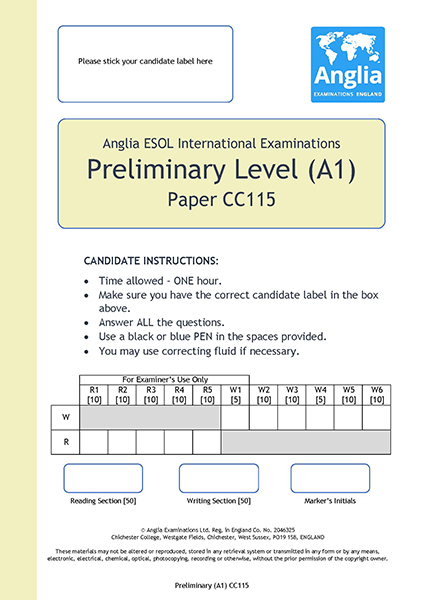
| GRAMMAR AND STRUCTURES | WHAT ARE THEY USED FOR? | SOME EXAMPLES |
| VERBS | ||
| Past Simple including common irregular past forms as well as regular forms, interrogative and negative | Talking about past events | We watched a football match on TV last night. I drove to the hotel. Did John drink all the orange juice? |
| Present Perfect Simple interrogative and negative | Talking about actions only recently completed Talking about experiences | The man has just eaten the sandwich. Have you ever been to London? I have never seen a dolphin. |
| Can + bare infinitive | Talking about skills. | I can play the guitar. |
| Imperative | Following single-step instructions in a familiar context | Take a piece of paper. Stand near the door. |
| ADJECTIVES | ||
| Basic adjectives | For descriptive purposes, including expressing opposites | My father bought a new car yesterday. |
| Comparatives and superlatives | Talking about comparisons between people and things | John isn’t as tall as Jane. Sue is the tallest / the most beautiful girl in our class. My rabbit is older than /more beautiful than my friend’s rabbit. |
| POSSESSIVES | ||
| The possessive form | Expressing ownership | That sandwich is Jane’s. |
| Mine, yours, his, hers, its, ours, theirs | Talking about ownership, possessions, who things belong to | My bicycle is newer than yours. That book is mine. |
| QUANTIFIERS | ||
| much, many, a lot, a lot of | Talking about amounts of things which can and cannot be counted | How much money have you got? I’ve got a lot of it! It rains a lot in England. How many brothers has she got? |
| some, any | Talking about things which can and cannot be counted, in the positive and negative | There is some bread. There isn’t any butter. |
| PREPOSITIONS | ||
| by, with, next to | Talking about where things are | The children are standing next to the clock. |
| ADVERBS | ||
| ever, never, ago, yet, just | Talking about when things happen | I went to Paris six years ago. |
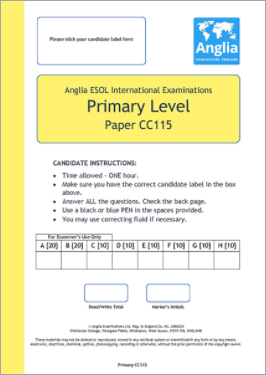
| GRAMMAR AND STRUCTURES | WHAT ARE THEY USED FOR? | SOME EXAMPLES |
| VERBS | ||
| There is/ there are | Identifying something/someone | There is a book on the table. There are four girls in the kitchen. |
| Present simple | Talking about habits, routines, facts (such as where a person lives), the actions of everyday life | My uncle lives in a small house. She is thirteen years old. I always take the bus to school. |
| The present simple with the verb ‘like’ + ‘ing’ in the third person singular and plural | Describing what people or animals like doing | My cat likes sleeping in the garden. My brothers like playing football in the park. |
| Present continuous | Talking about present actions | My brothers are playing football in the park at the moment. |
| Interrogative forms of the above two tenses | Asking and answering questions about the above | Do they often go to the cinema? Do you have/ Have you got a computer? Are the children doing their homework? Is she eating her breakfast at the moment? |
| Negative forms of the above two tenses | Making the above negative | Sue doesn’t like dogs. John isn’t studying now, he is talking on the phone. |
| The modal ‘can’ | Describing an ability or skill | He can play the guitar. They can cook. |
| PRONOUNS | ||
| All personal pronouns as subject or object – I, you, he, she, it, we, they, me, you, him, her, it, us, them | Describing and identifying people, animals and objects | Do you want my father? He is in the garden. John is with him. |
| Demonstrative pronouns – this, these, that, those | Asking for, and giving information | These are tables. That family is rich. Is this a kettle? |
| CONJUNCTIONS | ||
| because, and, or, but | Linking sentence parts and ideas | John and Mary are in the garden because it is sunny. |
| INTERROGATIVE WORDS | ||
| What, Who, Where, When, Why, How many | Asking questions about people, animals and objects | What is this? Who is that girl? Where are Peter and Paul? |
| ADVERBS | ||
| Adverbs of time – today, now, at the moment Adverbs of frequency – always, never, sometimes, often, usually, every day, every week, every month | Describing when and how often someone does something or something happens.Discriminating between the present continuous and the present simple | I usually eat an egg for breakfast. At the moment, John is playing in the park. |
| PREPOSITIONS | ||
| In, on, at, to | Talking about time, place, position | The examination finishes at 4 pm. My brother is 10 years old in August. I am going to Disney World on 1st August. |
| TIME EXPRESSIONS | ||
| 10.15 = ten fifteen or (a) quarter past ten | Telling the time | ten fifteen, twenty past one, half past ten, a quarter to two, eleven forty-five, etc. |
| NOUNS | ||
| Singular/plural simple nouns, including some common irregular ones Countable and uncountable nouns The names of common shapes | Talking about numbers of things Talking about amounts and quantities Describing the shape of something | e.g. book-books, box-boxes, man-men, woman-women, child-children, party-parties Can I have the butter? Can I have two sweets? This is a square. That is a circle. |
| SALUTATIONS (WRITING) | ||
| The formulaic salutations of informal writing in messages such as emails, postcards | Written communication | Dear love from |
| NOUNS: | SETS OF LEXICAL ITEMS |
| Clothes | dress, shirt, T-shirt, trousers, skirt, boots, socks, shoes, trainers, hat, watch jeans, jacket, tie, coat |
| Food, meals and drink | cake, ice-cream, biscuits, pizza, hamburger, hot-dog, omelette, steak, fish, salad, breakfast, lunch, dinner, party, milk, juice bread, tea, coffee, water, lemonade, egg, chicken, sandwich, sugar, ketchup, chips, cheese, sweets, butter |
| Birds | penguin, parrot, duck hen, chicken |
| Jobs | teacher, doctor, farmer, secretary, businessman/woman, policeman/woman, shop assistant, in the army, student |
| School | pen, pencil, rubber, ruler, book, desk, computer, blackboard, classroom, bag, friend teacher, homework, work, test, exam, student, lesson |
| Transport | helicopter, boat, bus, bicycle, car, train, aeroplane taxi, bike, motor bicycle, motorbike, tractor, lorry (Brit), truck (Amer) |
| Animals | monkey, lion, bear, elephant, crocodile, cat, dog, snake, tiger, zebra, rabbit, mouse fox, frog, spider, hippo, giraffe, horse, sheep, cow, pets |
| Household | television, video, chair, table, house, cassette-player, bed, bath, clock, picture, vase, photo, radio, door, mat, window, floor, cupboard mirror, sofa, armchair, shower, wardrobe |
| Kitchen | glass, plate, bowl, cup, knife, fork spoon |
| Vegetables | potato, tomato, carrot cabbage |
| Fruit | pear, peach, apple, banana, orange, lemon cherry, strawberry, melon |
| Fish | dolphin, octopus, shark, whale, starfish, fish goldfish |
| Garden | flower, tree, grass |
| Days of the week | day, week, Monday, Tuesday, Wednesday, Thursday, Friday, Saturday, Sunday weekend |
| Months of the year | January, February, March, April, May, June, July, August, September, October, November, December |
| Sport | football, tennis, swimming, basketball, volleyball baseball, fishing, football match, tennis racket, running |
| Places | park, garden, home, school, shop, house, kitchen, bedroom, bathroom, living room zoo, farm, supermarket, office, cinema, cafe, restaurant, car park, flat, swimming pool, town centre, beach, sea, mountains, town, city, village, fields, country (e.g. England etc.), countryside |
| Musical Instruments | guitar, piano, drum |
| Toys | ball, kite, castle, soldiers, paint, paintbrush, puppet, drum, gun |
| Weather | sun, rain, wind, snow, hot, cold |
| Parts of the body | hair, eyes, mouth, nose, face, arms, legs, foot/feet, head, hands |
| Letters | a-z |
| Cardinal numbers | one, two, three, four, five, six, seven, eight, nine, ten, eleven, twelve, thirteen, fourteen, fifteen, sixteen, seventeen, eighteen, nineteen, twenty twenty-one to sixty |
| Time expressions | four fifteen, [a] quarter past/to four, half past four, ten past four, four ten, ten to four, etc. morning, evening, today |
| Exams | letters, words, sentence, question, answer, story |
| Family members and people | mother, father, brother, sister, baby, girl, boy, child, children aunt, uncle, cousin, grandmother, grandfather, Mum, Dad, man, woman, friend |
| Shapes | square, circle, triangle, rectangle |
| Miscellaneous | film, newspaper, magazine, star, moon, thing |
| 2. Adjectives: | sets of lexical items |
| Size | tall, short, big, small, favourite, best, little |
| Feelings | happy, sad |
| Colours | black, blue, green, yellow, white, orange, red, grey, brown, pink, purple |
| Age | old, young, new |
| Other | clever, nice, good |
| Modifiers | Very |
| 3. VERBS | watch, play, listen, cook, wear, go, read, write, eat, drink, sit, stand, have, has, is, are, am live, work, walk, run, sleep, ride, drive, make, do, understand, want, like, can, swim, look, have/has got, get up, start, talk, buy, tell, clean, wash |
| 4. ARTICLES | a, an, the |
| 5. PERSONAL PRONOUNS | I, you, he, she, it, we, they me, him, them, us |
| 6. POSSESSIVE ADJECTIVES | my, your, his, her, our, their |
| 7. PREPOSITIONS | in, under, behind, on, near, in front of, at to, (by, about, for – may appear in certain expressions; not tested) |
| 8. QUESTION WORDS | What, When, Why, Where, Who, Whose |
| 9. ADVERBS | today, now, at the moment, never, always, sometimes, often, usually, every day, every week |
| 10. CONJUNCTIONS | because, and, or, then, next |
| 11. DEMONSTRATIVE PRONOUNS | this, that, these, those |